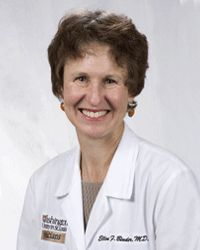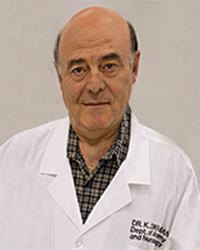Ellen Binder, MD, and Krikor Dikranian, MD, PhD, have been named the 2014-2016 Carol B. and Jerome T. Loeb Teaching Fellows at Washington University School of Medicine in St. Louis.
The fellowship program was established in 2004 with a gift from Carol and Jerome Loeb to advance clinical education and also is supported by the Barnes-Jewish Hospital Foundation. The two-year fellowships provide support to awardees, enabling them to implement innovative ideas that enhance the education of medical students and residents.
“We are so grateful for Mr. and Mrs. Loeb’s generosity in establishing these fellowships 10 years ago as a way to aid the advancement of health care through innovation,” said Larry J. Shapiro, MD, executive vice chancellor for medical affairs and dean of the School of Medicine. “Carol has magnificently carried on what she and her late husband, Jerome, began, which was recognizing the need to provide physicians opportunities to undertake specialized projects that advance patient care and teaching. We appreciate her ongoing commitment to the medical school.
“Drs. Binder and Dikranian will use their unique clinical knowledge and teaching expertise to develop interactive, web-based training tools using technologies that are changing the way knowledge and skills are acquired in a medical setting,” Shapiro added. “The support of the Loebs and Barnes-Jewish Hospital Foundation is essential to continuing the unsurpassed education and training provided to our students.”

Binder, an associate professor of medicine in the Division of Geriatrics and Nutritional Sciences and associate professor of occupational therapy, has achieved international recognition for her research on exercise and rehabilitation interventions in older adults. She also directs the Geriatrics Fellowship and Clerkship and is course master for a highly rated medical student selective on end-of-life care.
During her fellowship, Binder will create a website for Washington University trainees that includes case-based learning modules on topics in geriatrics, such as delirium, dementia, injury prevention and health-care system strategies that enhance transitions from homes or hospitals to care facilities. Progressively more complex case modules, each with embedded questions, explanations and references, will enable different levels of instruction as students advance.
Binder also will review existing web-based geriatrics training modules from other sources, which may be suitable for inclusion.
“Given the increasing number of older adults seeking care in almost all specialties, Ellen’s project has the potential to enhance the training of a great many of our residents,” said Alison Whelan, MD, senior associate dean for education at the School of Medicine.

Dikranian, an associate professor of anatomy and neurobiology and of physical therapy, is a previous recipient of the prestigious Samuel Goldstein Leadership Award in medical student education and was named lecturer of the year on three occasions. He plans to create a manual of medical neuroscience, which will be produced in iBook and eBook formats for iPad and Android tablet users, respectively.
The manual will integrate fundamental concepts in neural sciences and the clinical correlates in the form of case studies. It also will incorporate quizzes, which can be used to supplement learning for individual students or for students working in a group setting,
He envisions the manual as a set of virtual book chapters that will integrate links to relevant video clips along with the department’s comprehensive digitized microscopic image library, which will be annotated. Students will be able to access and reference vital images in high resolution via their mobile devices.
Dikranian previously produced the first faculty-published integrative electronic textbook, the Microscopic Anatomy Laboratory Manual, which has been well-received by first-year students in histology classes and soon will be published on iTunes University and Google Play.
“We know that our students become more active learners when provided a quality mix of online, classroom and hands-on learning,” said Whelan. “Krikor is giving our first-year students efficient access, in modalities familiar to them, to vast amounts of new information that will help them in their second year and beyond.”